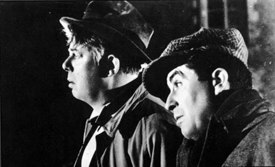On many best films of all time lists, this film inevitably makes an appearance. In the 2002 Sight & Sound poll (the definitive poll of critics and filmmakers every 10 years), the film was listed at #3, only behind Orson Welles’ CITIZEN KANE and Alfred Hitchcock’s VERTIGO. Is the film great? Yes. One of the best of all time? Well that can always be up for debate.
Part of the film’s power relies on the knowledge of the viewer going in. You need to know the film was made in 1939 just as the Nazis were knocking on France’s door. You also have to know a little bit about French society as well. Director Jean Renoir claims in a note at the beginning of the film that the production is not a social commentary, but that’s as much of a lie as any lie perpetrated by the characters in the film.
The film begins with André Jurieux celebrated flight over the Atlantic. French society sees him as a hero even if his accomplishment occurred 10 years after Lindberg’s flight. At the airport, instead of basking in the glory of the moment like a real hero should, André whines like a school boy about the fact that his “true love” Christine (Nora Gregor) did not come to see him.
We learn that Christine is a flirt and is married to Jewish aristocrat Robert de la Cheyniest (Marcel Dalio, CASABLANCA), who is continuing an affair with Geneviève de Marras (Mila Parély) because he doesn’t have the heart to hurt anyone. Christine’s childhood friend Octave (Renoir) tells André that he needs to live by the rules of society and behave a certain way. But it’s these rules that the film attacks because the wealthy class only plays them lip-service and ultimately turn out to be living lies.
But Renoir is not kind to the working class as well. Lisette (Paulette Dubost, PLAYTIME) is Christine’s devoted personal assistant, who finds no problem living in Paris with the madam while her husband Edouard Schumacher (Gaston Modot, CHILDREN OF PARADISE) works at the family estate in the country. The servants seem to be trying to immolate the fake passion of the wealthy. The poacher Marceau (Julien Carette, GRAND ILLUSION) begs Robert to work in the house so that he can wear the clothes that he dreams of. His affair with Lisette is more about the pursuit than what will come of it.
Even the people who seem to not be playing by the rules of the game like André and Schumacher really are. Renoir only allows the foreigners in the film — Christine and Octave — to finally break free from the rules if not for only a brief moment. The murder at the end of the film also turns into a lie. It’s this part of the film that so skewers the complacency of the French leading into World War II. Not even murder will dampen their obsession with glitz and glamour. The famed hunting scene is another metaphor for this idea.
Even at its base level the film works wonderfully as a simple farce, but knowing the history behind it makes it much deeper and more subversive. It was banned in France for being bad for morale in the lead up to war and then banned by the Nazis who burned many of the copies. Up until 1956, it was considered a lost film. Besides its thematic advances, the film had technical ones as well. The deep focus photography as well as the fluid camera movement during the big party scene has been emulated by many — even Welles in CITIZEN KANE. As prime action happens in the foreground, subplots develop in the background. Subtle and sly, it’s a classic for many reasons and a prerequisite for anyone calling them a film fan.








